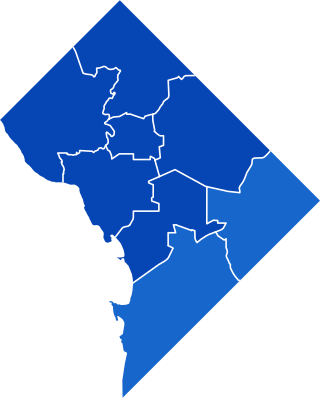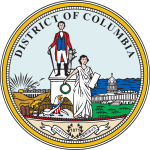The posts of shadow United States senator and shadow United States representative are held by elected or appointed government officials from subnational polities of the United States that lack congressional vote. While these officials are not seated in either chamber of Congress, they seek recognition for their subnational polity, up to full statehood. This would enfranchise them with full voting rights on the floor of the US House and Senate, alongside existing states. As of 2021, only the District of Columbia and Puerto Rico currently have authorized shadow delegations to Congress.

Paul Eric Strauss is an American politician and attorney serving as the senior United States shadow senator from the District of Columbia since 1997. He succeeded Jesse Jackson, the first person to hold the elected position of a shadow senator for Washington, D.C. He is a member of the Democratic Party.

Michael Donald Brown is an American politician serving as the junior United States shadow senator from the District of Columbia, having served since 2007.

The District of Columbia Democratic State Committee is the affiliate of the Democratic Party in the District of Columbia.

The 2018 United States Shadow Senator election in the District of Columbia took place on November 6, 2018, to elect a shadow member to the United States Senate to represent the District of Columbia. The member was only recognized by the District of Columbia and not officially sworn or seated by the United States Senate. Incumbent Mike Brown was re-elected to a third term.

On November 3, 2020, the District of Columbia held elections for several local and federal government offices. Its primary elections were held on June 2, 2020.

On November 3, 2020, the District of Columbia held a U.S. House of Representatives election for its shadow representative. Unlike its non-voting delegate, the shadow representative is only recognized by the district and is not officially sworn or seated.

On November 6, 2018, the District of Columbia held a U.S. House of Representatives election for its shadow representative. Unlike its non-voting delegate, the shadow representative is only recognized by the district and is not officially sworn or seated. Incumbent Shadow Representative Franklin Garcia won reelection unopposed.

On November 8, 2016, the District of Columbia held a U.S. House of Representatives election for its shadow representative. Unlike its non-voting delegate, the shadow representative is only recognized by the district and is not officially sworn or seated. Incumbent Shadow Representative Franklin Garcia won reelection unopposed.

On November 6, 2012, the District of Columbia held a U.S. House of Representatives election for its shadow representative. Unlike its non-voting delegate, the shadow representative is only recognized by the district and is not officially sworn or seated. Incumbent Shadow Representative Mike Panetta declined to run for a fourth term. Nate Bennett-Fleming was elected in his place.

The 2014 United States Shadow Senator election in the District of Columbia took place on November 4, 2014, to elect a shadow member to the United States Senate to represent the District of Columbia. The member was only recognized by the District of Columbia and not officially sworn or seated by the United States Senate. Incumbent Paul Strauss won his closest primary challenge against businessman Pete Ross and was easily elected to a fourth term.

The 2012 United States Shadow Senator election in the District of Columbia took place on November 6, 2012, to elect a shadow member to the United States Senate to represent the District of Columbia. The member was only recognized by the District of Columbia and not officially sworn or seated by the United States Senate. Incumbent Michael D. Brown was re-elected to a second term.

The 2006 United States Shadow Senator election in the District of Columbia took place on November 7, 2006, to elect a shadow member to the United States Senate to represent the District of Columbia. The member was only recognized by the District of Columbia and not officially sworn or seated by the United States Senate.

The 1994 United States Shadow Senator election in the District of Columbia took place on November 8, 1994, to elect a shadow member to the United States Senate to represent the District of Columbia. The member was only recognized by the District of Columbia and not officially sworn or seated by the United States Senate. Incumbent Shadow Senator Florence Pendleton won reelection to a second term.

On November 8, 1994, the District of Columbia held a U.S. House of Representatives election for its shadow representative. Unlike its non-voting delegate, the shadow representative is only recognized by the district and is not officially sworn or seated. Two-term incumbent and inaugural office-holder Charles Moreland declined to run for reelection and was succeeded by fellow Democrat John Capozzi.

On November 8, 2022, the District of Columbia held a U.S. House of Representatives election for its shadow representative. Unlike its non-voting delegate, the shadow representative is only recognized by the district and is not officially sworn or seated. Incumbent Shadow Representative Oye Owolewa was reelected to a second term.

The 1996 United States Shadow Senator election in the District of Columbia took place on November 11, 1996, to elect a shadow member to the United States Senate to represent the District of Columbia. The member was only recognized by the District of Columbia and not officially sworn or seated by the United States Senate. Incumbent Shadow Senator Jesse Jackson decided not to run for reelection. Local ANC Commissioner and lawyer Paul Strauss easily won the primary against little-known Eduardo Burkhart and also won the general election.

The 2002 United States Shadow Senator election in the District of Columbia took place on November 5, 2002, to elect a shadow member to the United States Senate to represent the District of Columbia. The member was only recognized by the District of Columbia and was not officially sworn or seated by the United States Senate. Incumbent Shadow Senator Paul Strauss decisively won the primary against challenger Pete Ross and was reelected to a second term by a landslide.

The 2008 United States Shadow Senator election in the District of Columbia took place on November 4, 2008, to elect a shadow member to the United States Senate to represent the District of Columbia. The member was only recognized by the District of Columbia and not officially sworn or seated by the United States Senate.
The District of Columbia is a political division coterminous with Washington, D.C., the capital city of the United States. According to the Article One of the Constitution, only states may be represented in the United States Congress. The District of Columbia is not a U.S. state and therefore has no voting representation in the United States Senate. However, it does have a non-voting delegate to represent it in the House.















